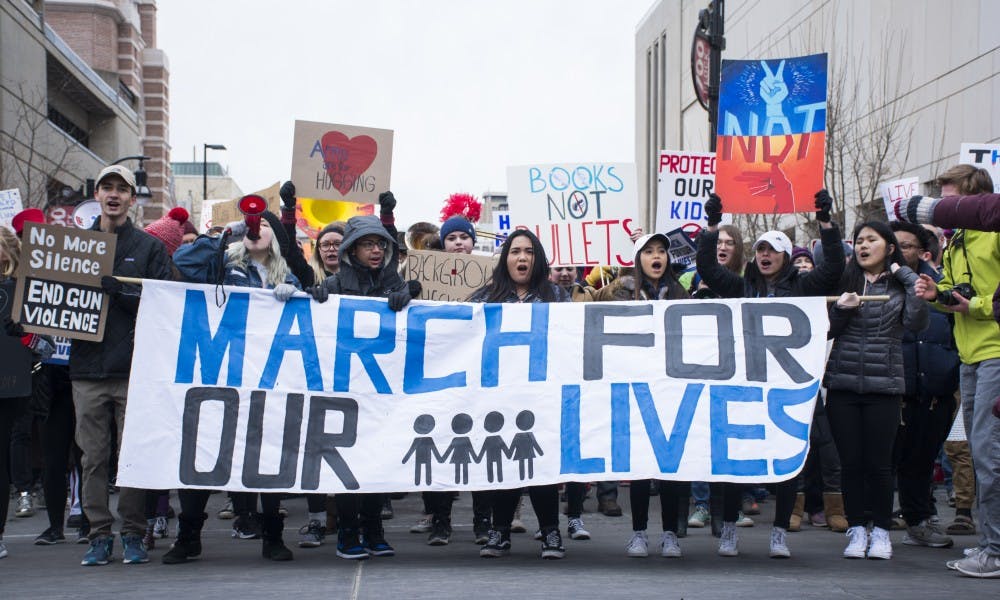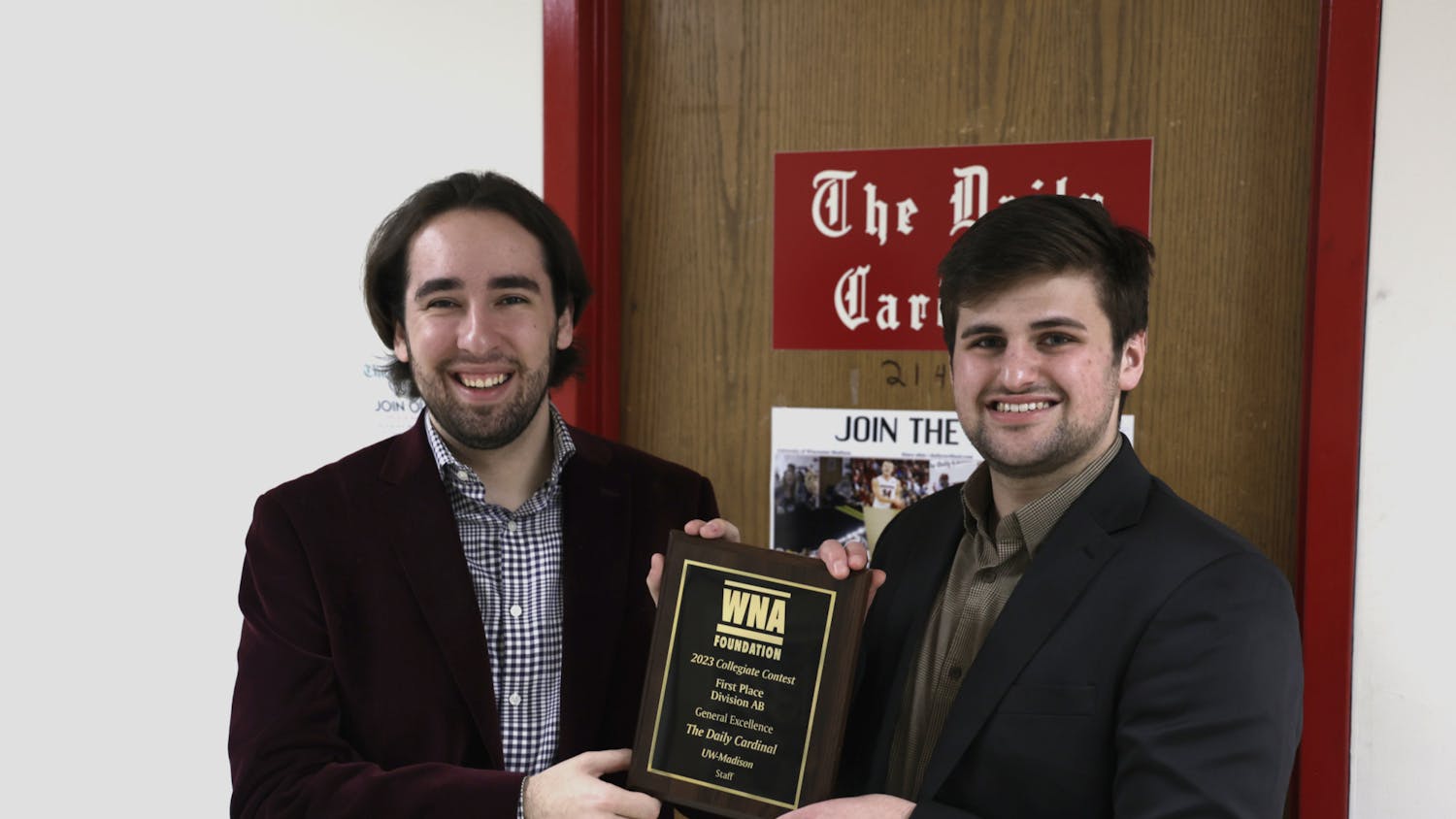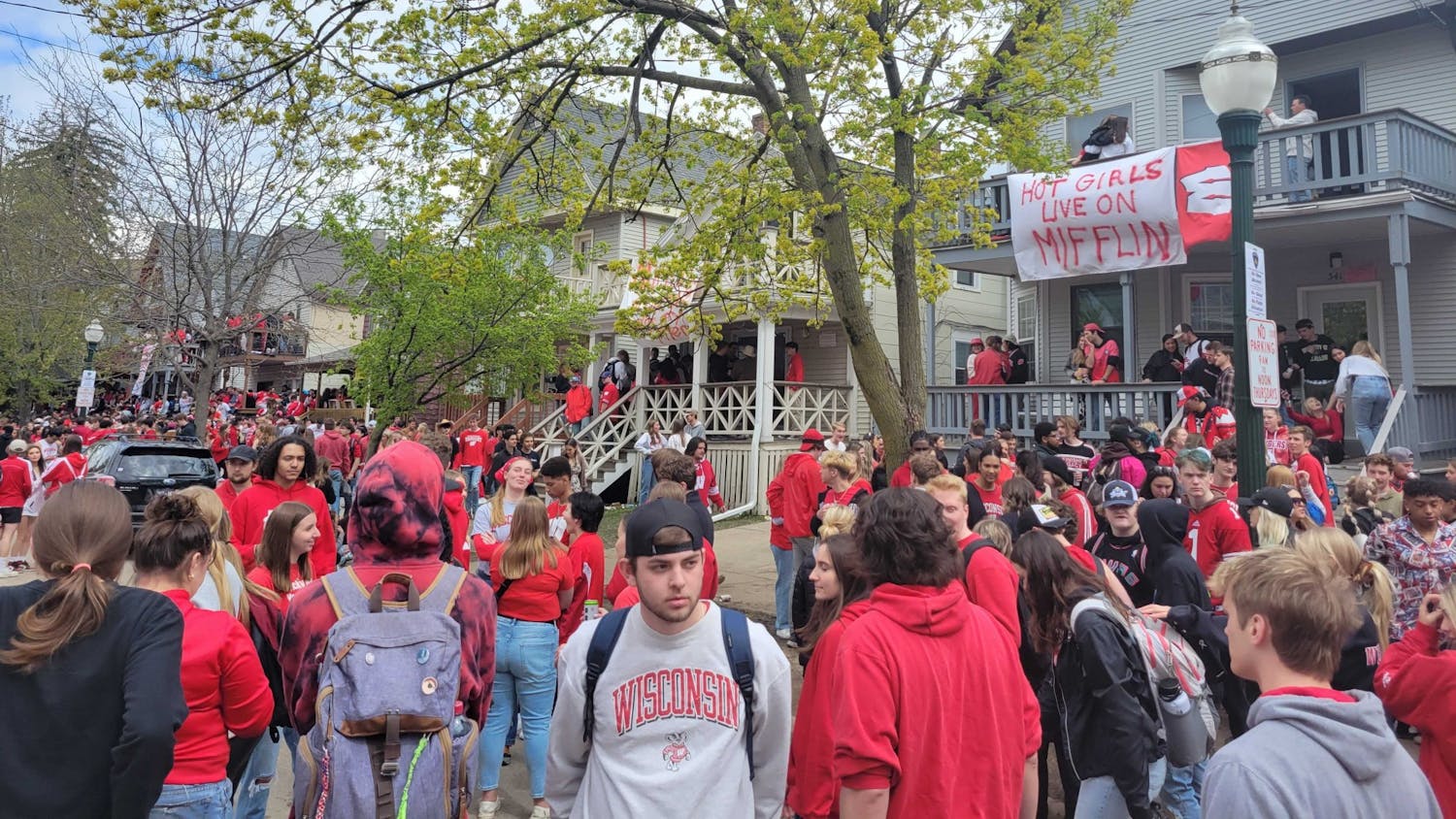Madison students, community members march to ask: ‘Am I next?”
On March 24, thousands of Madison-area students and community members surrounded the Capitol to make a statement: “Not one more.”
The crowd, which was a part of the international March For Our Lives, had gathered to demand that lawmakers address the epidemic of gun violence — which plagues communities nationwide on a daily basis.
“When I am in class and the door is left open, I sit in fear,” one student activist told the crowd.
Yet lawmakers have done nothing to address the issue. And without persistent pressure, they will continue to sit idly by.
To the student activists who have come together around this cause: You are the future. Continue to march. Continue the conversation about gun violence. Continue to stand up for what you believe in. Wherever you go, change will follow.

Alec Cook plea deal a step in the right direction, but not the leap we need
In late February, former UW-Madison student Alec Cook took a plea deal, pleading guilty to five criminal charges: Three counts of third degree sexual assault, one count of strangulation and suffocation and one count of stalking. But as a result of the plea deal, 16 of Cook’s charges were dropped. This means the maximum sentencing Cook could face is a 39.5 year prison sentence, required registration as a sex offender and up to $95,000 in fines for these five charges.
Yes, Cook’s plea deal is a step forward compared to the disgustingly unjust verdicts of other recent UW-Madison sexual assault cases, such as Nicholas Ralston, who received no jail time despite being found guilty of second degree sexual assault, and Nathan Friar, who was acquitted despite admitting to the crime in a text. Yes, when presented next to the cases that come before Cook’s, this plea deal appears miles ahead in a long-awaited path to justice. Yes, the plea deal is a relative positive when lengthy sexual assault trials can force survivors to relive their trauma and still provide ample opportunities time and time again for legal loopholes for rapists and assaultants to walk free. But as we move toward Cook’s sentencing, let’s remember the 16 charges that were dropped and ask ourselves: What’s so flawed in the plight for justice for sexual assault survivors that this, in a lot of ways, feel like a best-case scenario?
The cases before this have set the lowest possible bar. In our celebration of one small step toward justice, we must not hold our standard of justice to the precedents set by a flawed and unfair system. This is a step in a right direction, but a drop in the bucket toward the reform of the larger structural issues that plague our justice system.

Housing’s new dining plan is classist, threatens low-income students
While UW Housing clunkily unveiled their new dining plan late last semester, they have still not ironed out the kinks in what is going to become standard for all incoming residents starting next semester. The meal plan requires all incoming students to deposit a minimum of $1,400 on their Wiscard, which can only be used at Dining locations.
Since the plan was announced, students have rallied together to put a stop the the change. They claim that the updated meal plan puts an added financial burden on students who are already struggling to attend UW-Madison. With the cost of getting a higher education becoming steeper by the year, it is already a struggle for some students and families to even afford tuition. However, an additional $1,400 just to be able to eat is something that these families don’t need to be worrying about. It only makes the cost of attendance higher and creates another barrier for lower-income students and families to attend UW-Madison.

After a string of Democratic victories and low approval ratings for Gov. Scott Walker, there is a growing concern among Wisconsin Republicans that they could lose their stronghold in the state legislature this upcoming election cycle. This potential “Blue Wave” indicates the frustration toward Republican leadership at both the federal and state levels; however, it should by no means be interpreted as a foregone conclusion
Following the Supreme Court election in which the liberal nominee Rebecca Dallet decisively defeated conservative candidate Michael Screnock, Walker ominously warned Republicans of an impending “Blue Wave” in the coming midterms. According to the Wisconsin State Journal, Walker’s approval rating is around 43 percent, putting him in the bottom 10 of gubernatorial approval.
Walker’s unpopularity and concern for the upcoming election has caused him to prevent multiple special elections. While some may consider this abuse of power to not be a huge deal for Democrats, given the short amount of time these hypothetical winners would have had in office, it still indicates the widespread anxiety Republicans face, and the anti-democratic measures they are taking in the meantime.
After 2016, it is clear that political favorites, especially in Wisconsin, are still susceptible to upsets. Those excited at the prospect of unseating Walker and his fellow Republicans this fall must continue to capitalize on the current momentum while not growing complacent. In doing so, Wisconsin can powerfully express its discontent with Republican leadership that has spent recklessly, ignored calls for gun safety, degraded the environment and deprioritized college education.

Finance committee’s attendance debates wasted time and student money
In the past semester, the Student Services Finance Committee has allocated a good share of money to student groups on campus seeking funds for their activities.
At the same time, however, members debated an absence policy for an hour that they eventually shot down, discussed other attendance issues and internal problems during several meetings and held a full session in which an impeachment process for six representatives resulted in no one being removed from their post.
Students should take no issue with their finance committee taking the time to figure out how to equally serve groups from all backgrounds. But they should take issue with instances where those representatives, selected to fairly distribute segregated fees, instead use paid meeting time to talk about which of their absences should be excused.
It doesn’t matter whether students are paying half a penny or half a million pennies for SSFC’s time. Representatives should not spend it on longer-than-necessary discussions about their own attendance policy — especially not to answer questions about why one member couldn’t be in two places at once to show up for a meeting.
When voting on next year’s student government representatives, students should seek out a candidate who’s accountable to the responsible use of time and millions of dollars of student funding.

Soglin, City right to remove Confederate monuments
In mid-April, after months of contentious debate, Madison’s Common Council ordered the removal of two monuments honoring Confederate soldiers buried on Madison’s west side. The decision to do so was justified as the Confederacy fought to maintain slavery and white supremacy in the United States — a part of America’s history that should not be honored or commemorated.
The first monument was erected in 1906 and lists the names of the 140 Confederate soldiers buried in Madison’s Forest Hill Cemetery. The other monument was erected in 1981 to offer an explanation for the larger monument and labeled Confederate soldiers as “valient” and “unsung heroes.”
Several city alders voiced their displeasure with the monument's presence, with many labeling them as offensive to Madison’s African-American community, but those upset with their initial presence should be pleased with their forthcoming removal.

Despite remaining hurdles, System reorganization just makes sense
Thousands of students, faculty and administrators are watching closely as the UW System juggles implementing a planned re-organization of its two-year and four-year universities.
The plan, which would bring 13 two-year UW Colleges under the auspices of seven four-year universities, has met opposition from critics of UW System President Ray Cross. But the restructuring plan is similar to a model in Georgia, where graduation rates at the two-year schools involved doubled in a just over a year.
Turbulence has been the norm for UW Colleges in recent years. Budgets have been trimmed, faculty cut and the student experience has taken a hit. Restructuring would allow two-year and four-year schools to share resources and help reverse a 32 percent enrollment drop by providing an easier path for students to transfer to a four-year school.
But questions remain about the plan. UW Colleges Chancellor Cathy Sandeen told The Daily Cardinal the plan will need more time than initially thought to implement. It is important that administrators not rush the execution, lest they disrupt the college career of scores of students. But, if done correctly, this plan should be a benefit for all involved.

University transparent, honest in sharing sexual harassment records
The university recently released sexual harassment records after several news organizations made requests about sexual harassment claims at the university from the past ten years.
According to the the documents, more than $500,000 was given out by the university to settle sexual harassment and misconduct claims against employees over the past 10 years. Recently, a sociology teaching assistant was placed in a non-teaching role and will leave the university at the end of the year following reports from last fall 2017 about his harassment.
The university is setting the right example by releasing these documents, and other universities should follow their lead. Notably, UW-Milwaukee has failed to release their sexual harassment documents, despite numerous requests from media outlets to do so.
In the wake of the #MeToo movement, many women have been outspoken about harassment and inappropriate behavior from men and those in positions of power. While the university needs to keep taking steps toward creating a safe environment to learn and work, releasing these documents is a step in the right direction in showing support for those who have been victims of sexual harassment and abuse.
Cardinal View editorials represent The Daily Cardinal's organizational opinion. Each editorial is crafted independent of news coverage. Send all comments to editorialboard@dailycardinal.com.
UPDATE April 27 at 1:57 p.m.: This story has been amended to remove inaccurate information.






